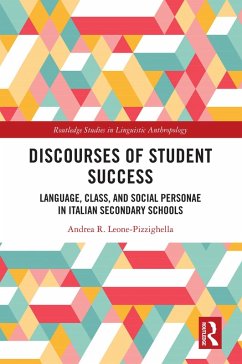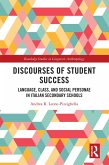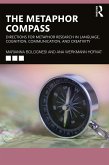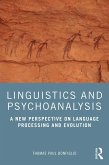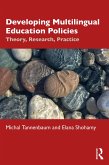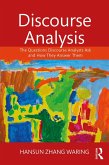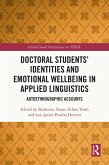Andrea R. Leone-Pizzighella
Discourses of Student Success (eBook, ePUB)
Language, Class, and Social Personae in Italian Secondary Schools
41,95 €
41,95 €
inkl. MwSt.
Sofort per Download lieferbar

21 °P sammeln
41,95 €
Als Download kaufen

41,95 €
inkl. MwSt.
Sofort per Download lieferbar

21 °P sammeln
Jetzt verschenken
Alle Infos zum eBook verschenken
41,95 €
inkl. MwSt.
Sofort per Download lieferbar
Alle Infos zum eBook verschenken

21 °P sammeln
Andrea R. Leone-Pizzighella
Discourses of Student Success (eBook, ePUB)
Language, Class, and Social Personae in Italian Secondary Schools
- Format: ePub
- Merkliste
- Auf die Merkliste
- Bewerten Bewerten
- Teilen
- Produkt teilen
- Produkterinnerung
- Produkterinnerung

Bitte loggen Sie sich zunächst in Ihr Kundenkonto ein oder registrieren Sie sich bei
bücher.de, um das eBook-Abo tolino select nutzen zu können.
Hier können Sie sich einloggen
Hier können Sie sich einloggen
Sie sind bereits eingeloggt. Klicken Sie auf 2. tolino select Abo, um fortzufahren.

Bitte loggen Sie sich zunächst in Ihr Kundenkonto ein oder registrieren Sie sich bei bücher.de, um das eBook-Abo tolino select nutzen zu können.
This book offers a linguistic ethnographic account of secondary schooling in Umbria, Italy, examining the complex intersection of language, socioeconomic class, social persona, and school choice to provide a holistic portrait of the situatedness of student "success."
- Geräte: eReader
- mit Kopierschutz
- eBook Hilfe
Andere Kunden interessierten sich auch für
![Discourses of Student Success (eBook, PDF) Discourses of Student Success (eBook, PDF)]() Andrea R. Leone-PizzighellaDiscourses of Student Success (eBook, PDF)41,95 €
Andrea R. Leone-PizzighellaDiscourses of Student Success (eBook, PDF)41,95 €![The Metaphor Compass (eBook, ePUB) The Metaphor Compass (eBook, ePUB)]() Marianna BolognesiThe Metaphor Compass (eBook, ePUB)39,95 €
Marianna BolognesiThe Metaphor Compass (eBook, ePUB)39,95 €![Linguistics and Psychoanalysis (eBook, ePUB) Linguistics and Psychoanalysis (eBook, ePUB)]() Thomas Paul BonfiglioLinguistics and Psychoanalysis (eBook, ePUB)38,95 €
Thomas Paul BonfiglioLinguistics and Psychoanalysis (eBook, ePUB)38,95 €![Developing Multilingual Education Policies (eBook, ePUB) Developing Multilingual Education Policies (eBook, ePUB)]() Michal TannenbaumDeveloping Multilingual Education Policies (eBook, ePUB)38,95 €
Michal TannenbaumDeveloping Multilingual Education Policies (eBook, ePUB)38,95 €![Discourse Analysis (eBook, ePUB) Discourse Analysis (eBook, ePUB)]() Hansun Zhang WaringDiscourse Analysis (eBook, ePUB)41,95 €
Hansun Zhang WaringDiscourse Analysis (eBook, ePUB)41,95 €![All English Accents Matter (eBook, ePUB) All English Accents Matter (eBook, ePUB)]() Pierre Wilbert OrelusAll English Accents Matter (eBook, ePUB)20,95 €
Pierre Wilbert OrelusAll English Accents Matter (eBook, ePUB)20,95 €![Doctoral Students' Identities and Emotional Wellbeing in Applied Linguistics (eBook, ePUB) Doctoral Students' Identities and Emotional Wellbeing in Applied Linguistics (eBook, ePUB)]() Doctoral Students' Identities and Emotional Wellbeing in Applied Linguistics (eBook, ePUB)41,95 €
Doctoral Students' Identities and Emotional Wellbeing in Applied Linguistics (eBook, ePUB)41,95 €-
-
-
This book offers a linguistic ethnographic account of secondary schooling in Umbria, Italy, examining the complex intersection of language, socioeconomic class, social persona, and school choice to provide a holistic portrait of the situatedness of student "success."
Dieser Download kann aus rechtlichen Gründen nur mit Rechnungsadresse in A, B, BG, CY, CZ, D, DK, EW, E, FIN, F, GR, HR, H, IRL, I, LT, L, LR, M, NL, PL, P, R, S, SLO, SK ausgeliefert werden.
Produktdetails
- Produktdetails
- Verlag: Taylor & Francis eBooks
- Seitenzahl: 218
- Erscheinungstermin: 27. September 2021
- Englisch
- ISBN-13: 9781000439823
- Artikelnr.: 62409825
- Verlag: Taylor & Francis eBooks
- Seitenzahl: 218
- Erscheinungstermin: 27. September 2021
- Englisch
- ISBN-13: 9781000439823
- Artikelnr.: 62409825
- Herstellerkennzeichnung Die Herstellerinformationen sind derzeit nicht verfügbar.
Andrea R. Leone-Pizzighella is a discourse analyst with an interest in the interplay of academic register and youth voices in adolescents' socialization to participate in schooling. She received her Ph.D. in Educational Linguistics from the University of Pennsylvania in 2019.
LIST OF FIGURES
LIST OF TABLES AND TRANSCRIPTS
ACKNOWLEDGMENTS
ABSTRACT
CHAPTER 1: ENTERING THE WORLD OF SECONDARY EDUCATION IN ITALY
Introduction
Getting to know Cittadina and finding my place in it
Gatekeeping at the three school field sites
The development of the modern-day Italian secondary school system
(1859-present)
The contemporary tripartite Italian education system
"Lyceumization" and the "descending mobility reorientation"
Modern challenges for equitable education in Italy
Infrastructure
Logistics
Human Resources
Internationalization
Macro-level policy vs. micro-level practices
Research questions
Overview of chapters
CHAPTER 2: WHAT DOES AN ANALYSIS OF LANGUAGE TELL US ABOUT SCHOOL AND
SOCIETY?
Why this book?
Language ideologies and la questione della lingua
What does language use have to do with the social project of education?
Constructing the self and others in academic spaces
Performing academic knowledge
Collecting data for a linguistic ethnography of education
Getting to know the field sites
Observing everyday life in the three classrooms
Group interviews
Analyzing the data for a linguistic ethnography of education
Transcription
Collaborative playback sessions
Discourse analysis
Analysis of narrative
CHAPTER 3: SOCIAL PERSONAE AND SCHOOL CHOICE IN CITTADINA
Introduction
Representations of School Types Circulating via Social Media
Student Narratives of School Choice
The Technical School
The Vocational School
The Classical Lyceum
Discussion
CHAPTER 4: PUBLIC PERFORMANCES OF SCHOOLED KNOWLEDGE IN CITTADINA
Introduction
Data Presentation and Analysis
Interrogazione in Latin Class at the Classical Lyceum
Interrogazione in Mechanical Systems Class at the Technical Institute
Lab Sessions in Fashion Design at the Vocational School
Discussion
CHAPTER 5: PEER-TO-PEER PERFORMANCES OF EXPERTISE
Introduction
Ventriloquating "School Voice" in Language Play
"Outside Voice" for School Topics
Using "Nonstandard" Language Features to Talk about Schoolwork
Peer Commentary on the Surprise Performance of 'Good Student' Persona
Refusing to Accept Expert Positioning
Discussion: Underlife, Communicative Repertoire, and Double-Voicing in
Peer-Peer Performances of Expertise
CHAPTER 6: EVERYDAY DEFINITIONS AND EVALUATIONS OF 'THE GOOD STUDENT'
ACROSS THE THREE SCHOOLS
Introduction
Defining Evaluative Terms: "bravo" and "scolarizzato"
Uses of the Terms across the Three Schools
Examples of bravo used spontaneously in the classroom
Definitions of terms by teachers
Other Ways of Describing Students and Student Performance
When Casual Evaluations Become Formal Grades
Conclusions and Implications of Using Overdetermined Language in Student
Evaluations
CHAPTER 7: CONCLUSION
Overview
Revisiting the Research Questions
How are the student bodies of these three school types (co)constructed via
narrative and metacommentary?
How do students perform knowledge for peers and teachers?
What does "success" look and sound like within and across the three school
types?
Implications and Future Directions
Concluding Remarks
LIST OF TABLES AND TRANSCRIPTS
ACKNOWLEDGMENTS
ABSTRACT
CHAPTER 1: ENTERING THE WORLD OF SECONDARY EDUCATION IN ITALY
Introduction
Getting to know Cittadina and finding my place in it
Gatekeeping at the three school field sites
The development of the modern-day Italian secondary school system
(1859-present)
The contemporary tripartite Italian education system
"Lyceumization" and the "descending mobility reorientation"
Modern challenges for equitable education in Italy
Infrastructure
Logistics
Human Resources
Internationalization
Macro-level policy vs. micro-level practices
Research questions
Overview of chapters
CHAPTER 2: WHAT DOES AN ANALYSIS OF LANGUAGE TELL US ABOUT SCHOOL AND
SOCIETY?
Why this book?
Language ideologies and la questione della lingua
What does language use have to do with the social project of education?
Constructing the self and others in academic spaces
Performing academic knowledge
Collecting data for a linguistic ethnography of education
Getting to know the field sites
Observing everyday life in the three classrooms
Group interviews
Analyzing the data for a linguistic ethnography of education
Transcription
Collaborative playback sessions
Discourse analysis
Analysis of narrative
CHAPTER 3: SOCIAL PERSONAE AND SCHOOL CHOICE IN CITTADINA
Introduction
Representations of School Types Circulating via Social Media
Student Narratives of School Choice
The Technical School
The Vocational School
The Classical Lyceum
Discussion
CHAPTER 4: PUBLIC PERFORMANCES OF SCHOOLED KNOWLEDGE IN CITTADINA
Introduction
Data Presentation and Analysis
Interrogazione in Latin Class at the Classical Lyceum
Interrogazione in Mechanical Systems Class at the Technical Institute
Lab Sessions in Fashion Design at the Vocational School
Discussion
CHAPTER 5: PEER-TO-PEER PERFORMANCES OF EXPERTISE
Introduction
Ventriloquating "School Voice" in Language Play
"Outside Voice" for School Topics
Using "Nonstandard" Language Features to Talk about Schoolwork
Peer Commentary on the Surprise Performance of 'Good Student' Persona
Refusing to Accept Expert Positioning
Discussion: Underlife, Communicative Repertoire, and Double-Voicing in
Peer-Peer Performances of Expertise
CHAPTER 6: EVERYDAY DEFINITIONS AND EVALUATIONS OF 'THE GOOD STUDENT'
ACROSS THE THREE SCHOOLS
Introduction
Defining Evaluative Terms: "bravo" and "scolarizzato"
Uses of the Terms across the Three Schools
Examples of bravo used spontaneously in the classroom
Definitions of terms by teachers
Other Ways of Describing Students and Student Performance
When Casual Evaluations Become Formal Grades
Conclusions and Implications of Using Overdetermined Language in Student
Evaluations
CHAPTER 7: CONCLUSION
Overview
Revisiting the Research Questions
How are the student bodies of these three school types (co)constructed via
narrative and metacommentary?
How do students perform knowledge for peers and teachers?
What does "success" look and sound like within and across the three school
types?
Implications and Future Directions
Concluding Remarks
LIST OF FIGURES
LIST OF TABLES AND TRANSCRIPTS
ACKNOWLEDGMENTS
ABSTRACT
CHAPTER 1: ENTERING THE WORLD OF SECONDARY EDUCATION IN ITALY
Introduction
Getting to know Cittadina and finding my place in it
Gatekeeping at the three school field sites
The development of the modern-day Italian secondary school system
(1859-present)
The contemporary tripartite Italian education system
"Lyceumization" and the "descending mobility reorientation"
Modern challenges for equitable education in Italy
Infrastructure
Logistics
Human Resources
Internationalization
Macro-level policy vs. micro-level practices
Research questions
Overview of chapters
CHAPTER 2: WHAT DOES AN ANALYSIS OF LANGUAGE TELL US ABOUT SCHOOL AND
SOCIETY?
Why this book?
Language ideologies and la questione della lingua
What does language use have to do with the social project of education?
Constructing the self and others in academic spaces
Performing academic knowledge
Collecting data for a linguistic ethnography of education
Getting to know the field sites
Observing everyday life in the three classrooms
Group interviews
Analyzing the data for a linguistic ethnography of education
Transcription
Collaborative playback sessions
Discourse analysis
Analysis of narrative
CHAPTER 3: SOCIAL PERSONAE AND SCHOOL CHOICE IN CITTADINA
Introduction
Representations of School Types Circulating via Social Media
Student Narratives of School Choice
The Technical School
The Vocational School
The Classical Lyceum
Discussion
CHAPTER 4: PUBLIC PERFORMANCES OF SCHOOLED KNOWLEDGE IN CITTADINA
Introduction
Data Presentation and Analysis
Interrogazione in Latin Class at the Classical Lyceum
Interrogazione in Mechanical Systems Class at the Technical Institute
Lab Sessions in Fashion Design at the Vocational School
Discussion
CHAPTER 5: PEER-TO-PEER PERFORMANCES OF EXPERTISE
Introduction
Ventriloquating "School Voice" in Language Play
"Outside Voice" for School Topics
Using "Nonstandard" Language Features to Talk about Schoolwork
Peer Commentary on the Surprise Performance of 'Good Student' Persona
Refusing to Accept Expert Positioning
Discussion: Underlife, Communicative Repertoire, and Double-Voicing in
Peer-Peer Performances of Expertise
CHAPTER 6: EVERYDAY DEFINITIONS AND EVALUATIONS OF 'THE GOOD STUDENT'
ACROSS THE THREE SCHOOLS
Introduction
Defining Evaluative Terms: "bravo" and "scolarizzato"
Uses of the Terms across the Three Schools
Examples of bravo used spontaneously in the classroom
Definitions of terms by teachers
Other Ways of Describing Students and Student Performance
When Casual Evaluations Become Formal Grades
Conclusions and Implications of Using Overdetermined Language in Student
Evaluations
CHAPTER 7: CONCLUSION
Overview
Revisiting the Research Questions
How are the student bodies of these three school types (co)constructed via
narrative and metacommentary?
How do students perform knowledge for peers and teachers?
What does "success" look and sound like within and across the three school
types?
Implications and Future Directions
Concluding Remarks
LIST OF TABLES AND TRANSCRIPTS
ACKNOWLEDGMENTS
ABSTRACT
CHAPTER 1: ENTERING THE WORLD OF SECONDARY EDUCATION IN ITALY
Introduction
Getting to know Cittadina and finding my place in it
Gatekeeping at the three school field sites
The development of the modern-day Italian secondary school system
(1859-present)
The contemporary tripartite Italian education system
"Lyceumization" and the "descending mobility reorientation"
Modern challenges for equitable education in Italy
Infrastructure
Logistics
Human Resources
Internationalization
Macro-level policy vs. micro-level practices
Research questions
Overview of chapters
CHAPTER 2: WHAT DOES AN ANALYSIS OF LANGUAGE TELL US ABOUT SCHOOL AND
SOCIETY?
Why this book?
Language ideologies and la questione della lingua
What does language use have to do with the social project of education?
Constructing the self and others in academic spaces
Performing academic knowledge
Collecting data for a linguistic ethnography of education
Getting to know the field sites
Observing everyday life in the three classrooms
Group interviews
Analyzing the data for a linguistic ethnography of education
Transcription
Collaborative playback sessions
Discourse analysis
Analysis of narrative
CHAPTER 3: SOCIAL PERSONAE AND SCHOOL CHOICE IN CITTADINA
Introduction
Representations of School Types Circulating via Social Media
Student Narratives of School Choice
The Technical School
The Vocational School
The Classical Lyceum
Discussion
CHAPTER 4: PUBLIC PERFORMANCES OF SCHOOLED KNOWLEDGE IN CITTADINA
Introduction
Data Presentation and Analysis
Interrogazione in Latin Class at the Classical Lyceum
Interrogazione in Mechanical Systems Class at the Technical Institute
Lab Sessions in Fashion Design at the Vocational School
Discussion
CHAPTER 5: PEER-TO-PEER PERFORMANCES OF EXPERTISE
Introduction
Ventriloquating "School Voice" in Language Play
"Outside Voice" for School Topics
Using "Nonstandard" Language Features to Talk about Schoolwork
Peer Commentary on the Surprise Performance of 'Good Student' Persona
Refusing to Accept Expert Positioning
Discussion: Underlife, Communicative Repertoire, and Double-Voicing in
Peer-Peer Performances of Expertise
CHAPTER 6: EVERYDAY DEFINITIONS AND EVALUATIONS OF 'THE GOOD STUDENT'
ACROSS THE THREE SCHOOLS
Introduction
Defining Evaluative Terms: "bravo" and "scolarizzato"
Uses of the Terms across the Three Schools
Examples of bravo used spontaneously in the classroom
Definitions of terms by teachers
Other Ways of Describing Students and Student Performance
When Casual Evaluations Become Formal Grades
Conclusions and Implications of Using Overdetermined Language in Student
Evaluations
CHAPTER 7: CONCLUSION
Overview
Revisiting the Research Questions
How are the student bodies of these three school types (co)constructed via
narrative and metacommentary?
How do students perform knowledge for peers and teachers?
What does "success" look and sound like within and across the three school
types?
Implications and Future Directions
Concluding Remarks
